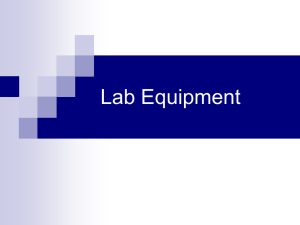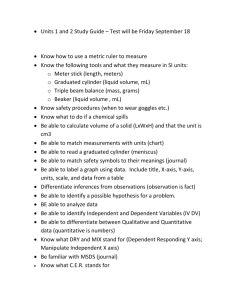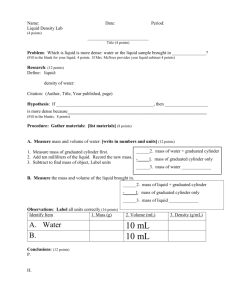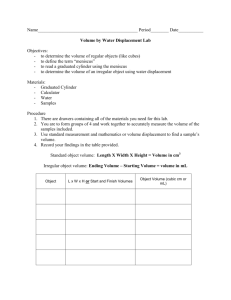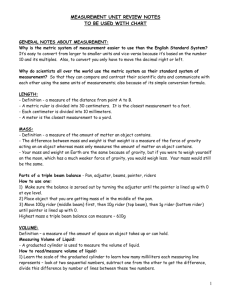Document
advertisement
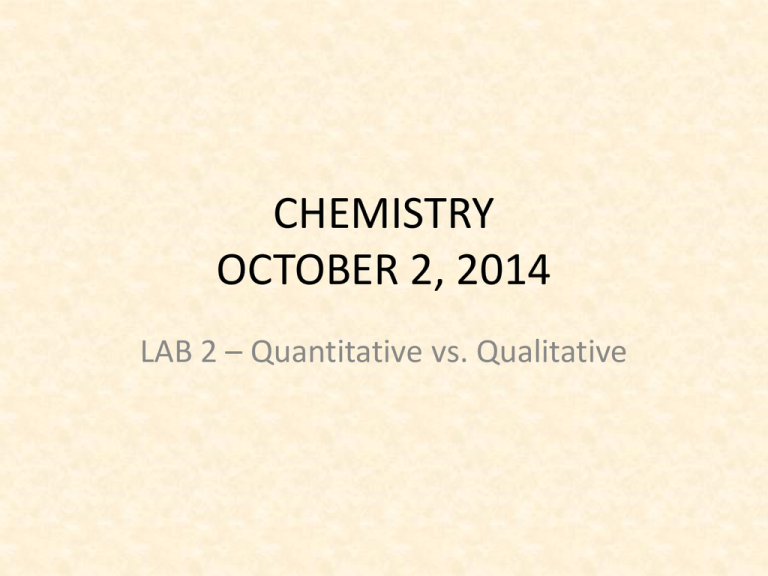
CHEMISTRY OCTOBER 2, 2014 LAB 2 – Quantitative vs. Qualitative PRE-LAB • Take 2 minutes to read the PreLab on page 1 of the packet. This is silent and solo activity. OBJECTIVE • SWBAT – Learn to perform qualitative observations – Learn to perform quantitative observations AGENDA –Pre-Lab –Perform the Lab –Complete the Lab Questions IMPORTANT DATES • Quiz 03 – Friday – First 15 minutes • Test 01 – Next Friday TRIPLE BEAM BALANCE TRIPLE BEAM BALANCE • The triple beam balance is used to measure mass • Calibrate before measurement HOW TO USE THE TBB – place the object to be measured on the pan – Move the 100 gram slider along the beam to the right until the indicator drops below the fixed mark. The notched position immediately to the left of this point indicates the number of hundreds of grams. – Now move the 10 gram slider along the beam to the right until the indicator drops below the fixed mark. The notched position immediately to the left of this point indicates the number of tens of grams. HOW TO USE THE TBB (cont’) – The beam in front is not notched; the slider can move anywhere along the beam. The boldface numbers on this beam are grams and the tick marks between the boldface numbers indicate tenths of grams. – To find the mass of the object on the pan, simple add the numbers from the three beams. QUESTIONS • Answer questions 4-6 related to the TBB GRADUATED CYLINDER GRADUATED CYLINDER • The graduated cylinder is used to measure volume • Graduated cylinders come in various sizes. – Record yours – What is the maximum capacity of your graduated cylinder? – What is the smallest division of your cylinder? – How many decimal places should be included in reporting a measured volume? GRADUATED CYLINDER READING MENISCUS • Read the graduated cylinder by reading the meniscus (the lowest portion of the convex dip of the liquid) – Meniscus form because of adhesion force is stronger than cohesion force USING THE INSTRUMENTS QUALITATIVE OBSERVATIONS • Record your observations into the table for the rubber stopper, the cork stopper and the antacid – For this lab, you DO NOT taste any of the objects QUANTITATIVE MEASUREMENTS • Record the quantitative measurements for the rubber stopper and the cork stopper and complete the table – Mass – Volume DENSITY • State the density formula • Perform the density calculation for both stoppers LAW OF CONSERVATION OF MASS • The Law of Conservation of Mass states that in a chemical reaction, the mass of the product equals the mass of the reactants ANTACID • Perform the qualitative observations of the antacid • What happens to the mass when antacid is placed into a sealed bag? CLEAN UP • CLEAN UP AROUND YOU • LEAVE THE TRIPLE BEAM BALANCE AT THE DESK • DUMP OUT THE WATER INTO THE SINK FROM THE ZIP LOCK BAG AND THROW AWAY THE ZIP LOCK BAG • BRINK THE GRADUATED CYLINDERS, STOPPERS AND BEAKERS BACK TO THE LAB TAPLE AND SEPARATE INTO ITS INDIVIDUAL GROUPS
